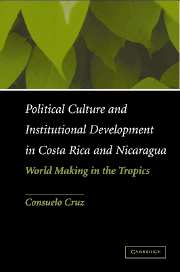 Political Culture and Institutional Development in Costa Rica and Nicaragua
Political Culture and Institutional Development in Costa Rica and Nicaragua Book contents
- Frontmatter
- Contents
- Acknowledgments
- List of Abbreviations
- Chronology
- Political Culture and Institutional Development in Costa Rica and Nicaragua
- Introduction
- 1 Theoretical Overview
- 2 Manichean Identities and Normative Scheming: Origins
- 3 Orphans of Empire: Constructing National Identities
- 4 Postcolonial Paths: Rhetorical Strategies and Frames
- 5 Costa Rica: Possibility Mongers
- 6 Nicaragua: Hybrid Arbitration
- 7 Tropical Histories: Paradise and Hell on Earth
- 8 Transition: Familiar Novelties
- Conclusion
- Index
Conclusion
Published online by Cambridge University Press: 20 August 2009
- Frontmatter
- Contents
- Acknowledgments
- List of Abbreviations
- Chronology
- Political Culture and Institutional Development in Costa Rica and Nicaragua
- Introduction
- 1 Theoretical Overview
- 2 Manichean Identities and Normative Scheming: Origins
- 3 Orphans of Empire: Constructing National Identities
- 4 Postcolonial Paths: Rhetorical Strategies and Frames
- 5 Costa Rica: Possibility Mongers
- 6 Nicaragua: Hybrid Arbitration
- 7 Tropical Histories: Paradise and Hell on Earth
- 8 Transition: Familiar Novelties
- Conclusion
- Index
Summary
For an emerging people to be capable of appreciating the sound maxims of politics and to follow the fundamental rules of statecraft, the effect would have to become the cause. The social spirit which ought to be the work of that institution, would have to preside over the institution itself. And men would be, prior to the advent of laws, what they ought to become by means of laws.
–Jean-Jacques RousseauRousseau's dilemma has vexed theorists and political actors alike. Ultimately, Rousseau settled for the deus ex machina of the “lawgiver.” So too have many powerful leaders who have made themselves the arbiters of their peoples' conflicting claims to status, wealth, and justice. We have seen, however, that postcolonial Costa Ricans solved this dilemma differently. They forged a national identity that conceived of “the people” not as a republican abstraction but as a historically grounded group whose defining narrative trumpets its high normative worth and the practical attributes associated with its collective virtues.
Such practical attributes, it should be noted, included not only the competencies but also the vulnerabilities that attached to their defining virtues. Furthermore, both in Costa Rica and Nicaragua, the narratives themselves were not reducible to a shared identity that hinged merely on a common “sense of belonging” either to a “distinctive culture” or “to a polity.” Rather, the narratives flowed from “belonging” to a system of normative scheming that enabled actors to make political and institutional choices they could claim to be both realistic and appropriate.
- Type
- Chapter
- Information
- Political Culture and Institutional Development in Costa Rica and NicaraguaWorld Making in the Tropics, pp. 263 - 276Publisher: Cambridge University PressPrint publication year: 2005


